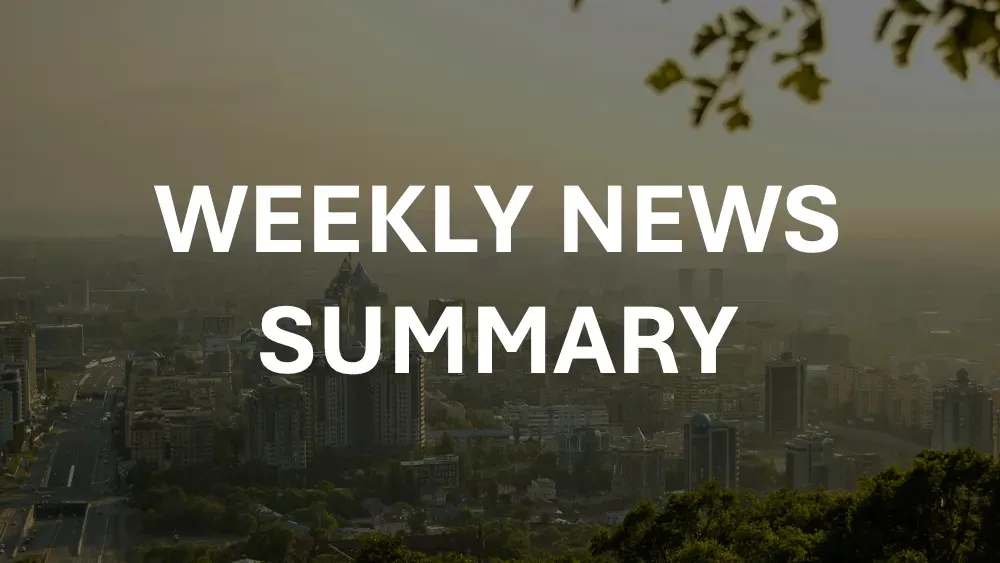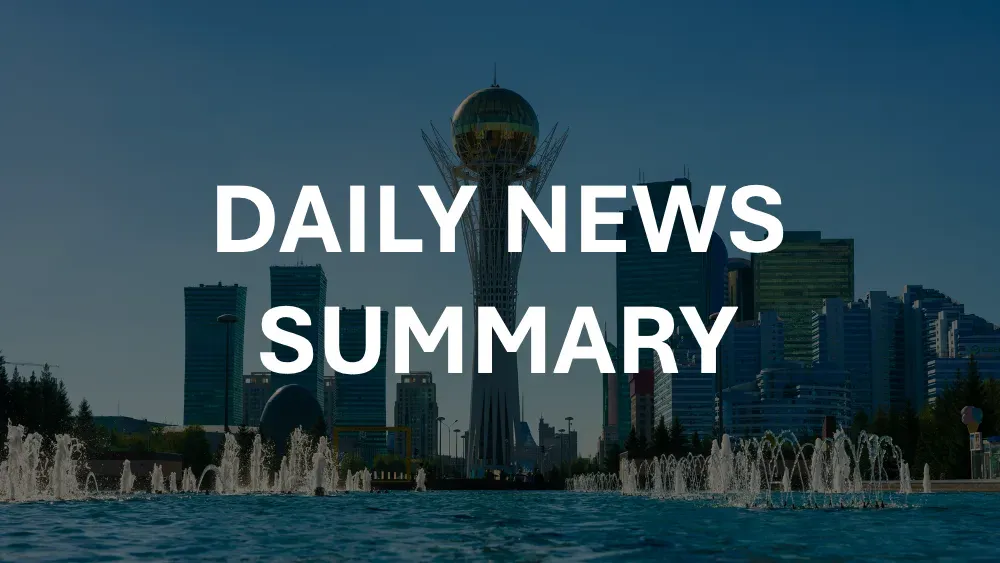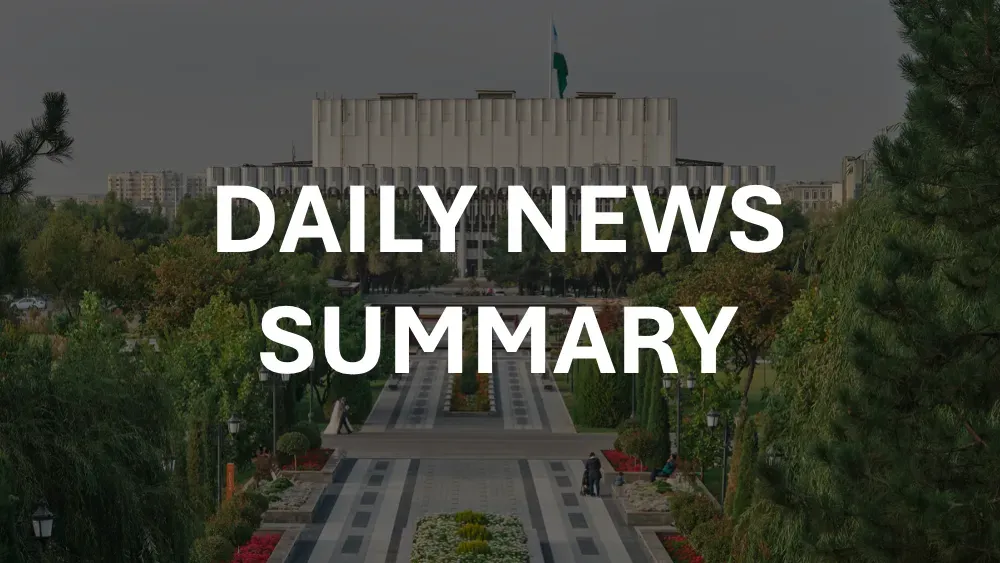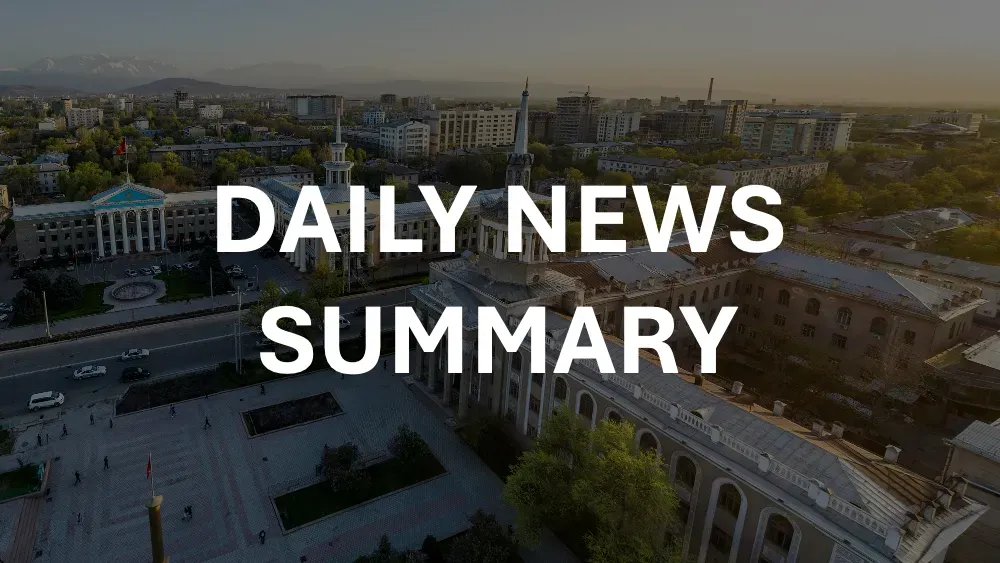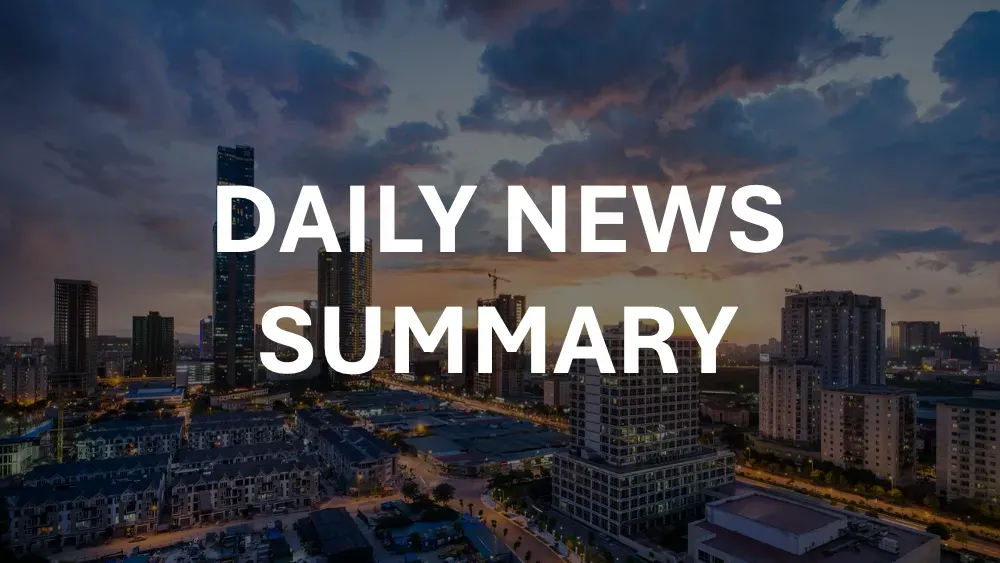This weekly digest showcases just 10 stories. Daily subscribers receive comprehensive intelligence briefs with 40 of the top stories organized by category. Don't miss the stories that matter.
Subscribe to Daily →
September 5, 2025 to September 11, 2025
This week's top 10 stories from Kazakhstan, selected from our daily intelligence briefs.
1. Government Unveils Multi-Track Agenda to Double GDP by 2029, Launches AI, Investment and Border Overhauls
Kazakh Prime Minister Olzhas Bektenov unveiled a multi-track reform agenda aiming to double national GDP by 2029 through a rapid investment cycle, AI-driven public services and infrastructure modernization. Key measures announced include a single investor interface backed by stronger legal guarantees, sectoral incentives for high‑tech manufacturing, a revamped state role with tighter budget discipline, and consolidation of processing‑industry support into a unified package. Institutional steps include a presidential decree to grant Alatau City special status, creation of a new AI and Digital Development Ministry, and rollout of a “Digital Qazaqstan” concept.
Technological and border initiatives are central to delivery: a national data‑processing center using AI will underpin tax and customs administration, eight external EAEU border checkpoints are slated for modernization by year‑end to reduce crossing times, and construction will adopt AI‑enabled building information modeling. Special Economic Zones may move to new management models with potential foreign operators; social policy changes include digital platforms, social audits added to the Social Code and updated social support standards. The program signals a strong state‑led push to attract investment and digitize governance, with 2029 growth targets raising implementation and financing challenges for international partners and investors.
From daily brief: 2025-09-11
2. President Tokayev Delivers Annual Address to Parliament with Nationwide Live Broadcast
President Kassym‑Jomart Tokayev delivered his annual Address to the Nation at a joint session of Parliament today, opening the new parliamentary session with a live broadcast from 11:00 via national TV, radio and Akorda’s social channels. The session—attended by senators, deputies, central government leaders, members of the National Kurultai and civic representatives—continues Kazakhstan’s tradition of a policy-setting speech that directs executive action and shapes the legislative agenda; full text and live streams were published by multiple outlets.
For international professionals, the Address is a primary signal for near‑term shifts in economic policy, regulation and social priorities that will affect investment planning and compliance timelines; ministries typically receive specific implementation orders following the speech. Observers should monitor the published full text and subsequent ministerial directives for concrete measures, timelines and any quantitative targets announced.
From daily brief: 2025-09-09
3. President Orders Overhaul of Investment Attraction, Assigns Coordination to Prime Minister and Rebrands Prosecutor’s Committee
President Kassym-Jomart Tokayev has ordered an urgent overhaul of Kazakhstan’s investment-attraction architecture, centralizing coordination under the Prime Minister and demanding concrete proposals within 10 days. Citing fragmented responsibilities and excessive bureaucracy, Tokayev instructed the government to produce a short-term, detailed roadmap to modernize investor relations, reduce duplication of functions and streamline procedures—moves intended to improve deal flow and lower perceived investment risk.
As part of the pivot toward investor assurance, Tokayev also directed renaming the Prosecutor General’s Asset Recovery Committee to the Investor Rights Protection Committee; authorities said roughly 850 billion tenge recovered to date has been redirected into social infrastructure. The measures signal both administrative consolidation at the executive level and a rebranding of enforcement bodies to emphasize investor protection, changes international professionals should monitor for implications on regulatory clarity, project approvals and investor safeguards.
From daily brief: 2025-09-09
4. Plan to Double Air Cargo and Build a Eurasian Transport Hub Advances with Airports, Rail Upgrades, and New National Freight Carrier
President Kassym‑Jomart Tokayev has ordered a strategic initiative to make Kazakhstan a Eurasian transport and air‑logistics hub, directing the government to double air cargo volumes and create a national freight carrier with major foreign investors. The push includes integrating air hubs into global supply chains, regulatory reforms for express cargo, and rapid legal adoption of drones and autonomous freight vehicles to modernize last‑mile and long‑haul logistics.
Implementation will lean on recent and planned infrastructure upgrades: new airport terminals in Almaty, Shymkent and Kyzylorda; near‑complete airports at Zaysan, Katon‑Karagay and Kendirli; and reconstruction of Arkalyk airport. Passenger rail modernization is also targeted through a new wagon assembly plant in Astana and development of modern carriages with foreign partners. For international logistics and investors, these measures signal accelerated market opening, regulatory change, and capacity expansion aimed at making Kazakhstan a principal Eurasian cargo node.
From daily brief: 2025-09-09
5. Shanghai Cooperation Summit Highlights Transit Expansion, Visa-Free Travel Deals, and Tighter Financial Oversight
At the Shanghai Cooperation Organization summit in Tianjin, President Kassym-Jomart Tokayev used his official China visit to advance regional connectivity and regulatory alignment. Delegates discussed expanding the China–Europe transit corridor — a move that could increase freight throughput through Eurasian logistics hubs — and signed agreements to broaden visa‑free travel, aimed at facilitating business mobility and tourism between member states.
Media reports also highlighted planned legislative changes in Kazakhstan to tighten financial monitoring and anti‑money‑laundering compliance, part of a broader push to meet international transparency standards and boost investor confidence. Timelines and sector‑specific impacts were not detailed in the coverage, but the combined emphasis on infrastructure, mobility, and governance points to coordinated efforts to strengthen trade flows and cross‑border investment links.
From daily brief: 2025-09-07
6. President to Deliver Annual Address to Parliament on September 8, Live Nationwide
President Kassym-Jomart Tokayev will deliver his annual Address to the Nation on September 8 at 11:00 local time before a joint session of both chambers of Parliament, with cabinet ministers, members of the National Kurultai, civil society representatives and workers present. The speech will be broadcast live on national television and the Akorda social channels; parliamentary leadership has already scheduled the session, underscoring the Address’s formal role in setting the 2025 legislative and regulatory agenda.
The Address typically outlines priorities across the economy, governance and social sectors, and media coverage has framed this year’s delivery as a continuity with last year’s September 2 Address, which stressed investment dynamics and structural reforms. International observers and domestic stakeholders will be watching for updates on reform implementation, new targets for investment and economic management, and any regulatory initiatives that could affect foreign investors and cross‑border economic ties.
From daily brief: 2025-09-06
7. Parliament Approves Tighter AML/CFT Rules, Expanding Scrutiny of Nonprofits and Proliferation Risks
Kazakhstan’s Senate has approved a package of amendments tightening anti‑money‑laundering, counter‑terrorist‑financing (AML/CFT) and proliferation‑financing controls, giving the Financial Monitoring Agency (FMA) an explicit mandate to analyze suspicious transactions involving non‑profit organizations (NPOs). Passed in two readings, the law expands risk‑based oversight and clarifies reporting obligations for banks, payment firms and entities handling high‑risk sectors and cross‑border flows, aligning domestic practice with international AML/CFT and WMD‑proliferation standards and signaling that enforcement of compliance requirements will be stepped up.
The text emphasizes the FMA’s new analytical role over NPO transactions but leaves key practical elements—secondary regulations and implementation guidance—undetermined; no timeline or further agency statements were provided. For international NGOs and charities operating in Kazakhstan, the changes imply heightened scrutiny and potential operational impacts once implementing rules are published.
From daily brief: 2025-09-05
8. Trans-Caspian Corridor Freight Set to Reach 10 Million Tons After Sixfold Surge
Freight on the Trans‑Caspian International Transport Route has grown sixfold over five years, climbing from 800,000 tonnes in 2020 to 4.5 million tonnes in 2023, and authorities are now targeting 10 million tonnes. Deputy Prime Minister Kanat Bozumbayev cited the sustained expansion as evidence of the corridor’s rising competitiveness for containerized and bulk cargo as shippers diversify away from traditional northern routes between Central Asia and Europe via the Caspian Sea.
Realizing the 10 million‑tonne objective will require continued investment in port capacity, rail interoperability and customs streamlining across Kazakhstan, Azerbaijan and Georgia; bottlenecks are likely at Aktau and Kuryk without upgrades and coordinated schedules. The scaling plan implies opportunities for logistics operators, exporters and energy shippers, though no timeline or financing details have been disclosed.
From daily brief: 2025-09-05
9. Astana and Gazprom Discuss Expanded Gas Transit, Supply, and Processing at Eastern Economic Forum
At the Eastern Economic Forum, Kazakhstan’s First Deputy Prime Minister Roman Sklyar met with Gazprom CEO Alexey Miller to review existing cooperation and explore expanded projects in gas supply, transit, and processing, as well as broader infrastructure ties. Both sides framed the discussions around long‑term energy security and strategic partnership, signaling intent to further integrate Central Asian and wider Eurasian gas flows through enhanced cross‑border transit routes and potential upgrades to processing capacity.
No contracts were announced, but the meeting — held within the SHYEF‑2025 framework — reaffirms Astana’s drive to diversify energy routes and shore up domestic supply reliability via collaboration with Russia’s state gas major; officials committed to continued dialogue and pursuit of mutually beneficial projects.
From daily brief: 2025-09-06
10. AI and Digital Code Bills Target Passage by Year-End to Accelerate E-Government Drive
Kazakhstan plans to adopt a unified Digital Code and a dedicated Artificial Intelligence law by the end of 2025 as part of President Kassym-Jomart Tokayev’s drive to “turn the country into a digital state within three years.” Parliamentary Speaker Yerlan Koshanov said drafting is underway and set an end‑of‑year deadline during a Mazhilis plenary session; if passed on schedule the legislation will create regulatory mechanisms for AI deployment, data governance and digital public services.
The framework is likely to set standards and compliance requirements affecting government procurement, financial services and technology firms, and to clarify state oversight of emerging technologies. For international professionals, the bills signal accelerated legal certainty for digital projects in Kazakhstan but also potential new regulatory obligations for foreign vendors and investors engaging with public‑sector digitalisation.
From daily brief: 2025-09-11
About This Weekly Digest
The stories above represent the most significant developments from Kazakhstan this week, selected through our AI-powered analysis of hundreds of local news articles. Our ranking system evaluates each story based on:
• Impact on international interests - How the story affects diplomatic, business, and development activities • Strategic significance - The story's importance for understanding Kazakhstan's trajectory and regional dynamics
• Economic and political weight - The scale of economic impact or political change involved • Relevance to foreign professionals - Direct implications for international organizations and businesses operating in Kazakhstan
Stories are drawn from our daily intelligence briefs, which synthesize reporting from Kazakhstan's leading news sources to provide comprehensive situational awareness for international decision-makers.
These weekly highlights are a small sample of what's happening. Daily subscribers get comprehensive briefings with 40 top stories that connect the dots between events, track developing stories, and provide the context you need for informed decision-making.
Upgrade to Daily →
